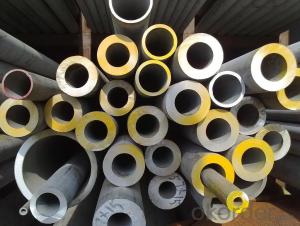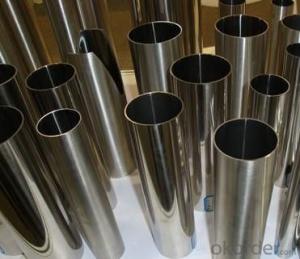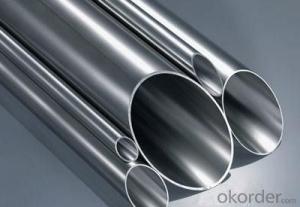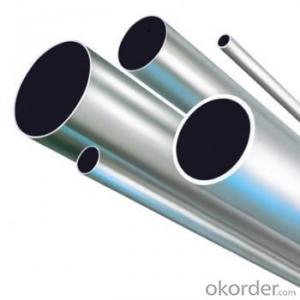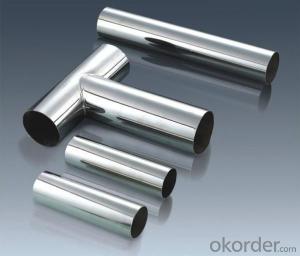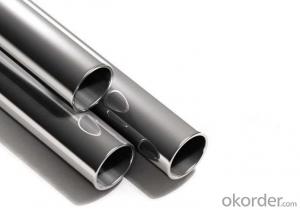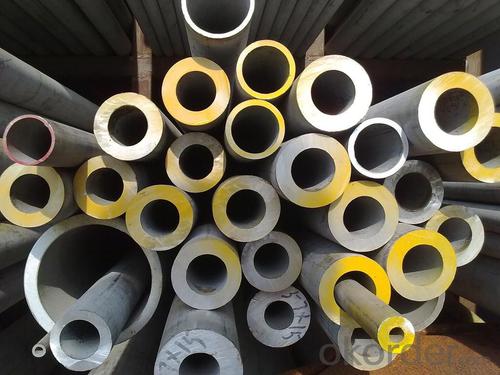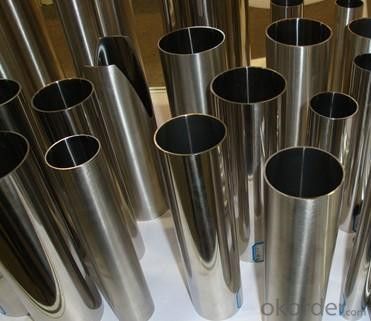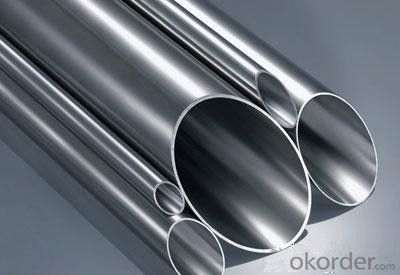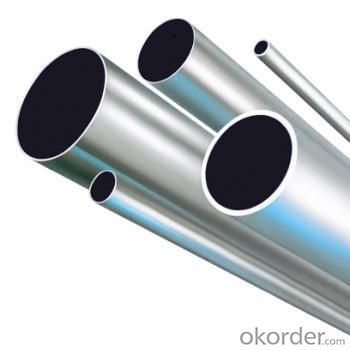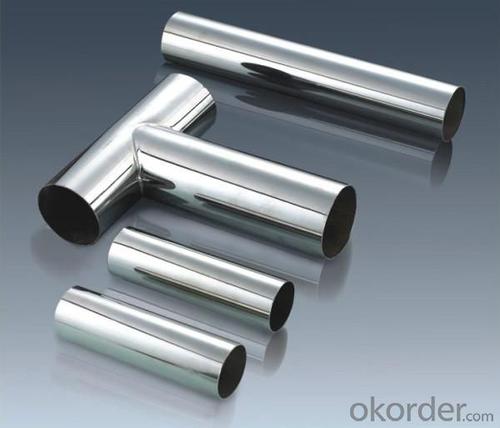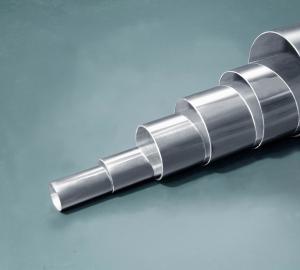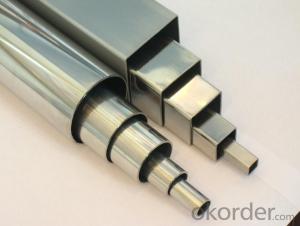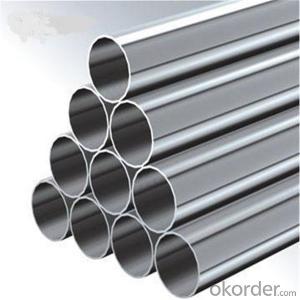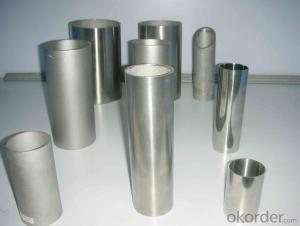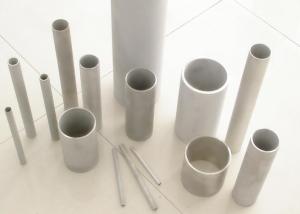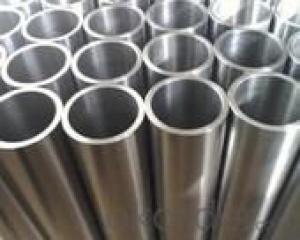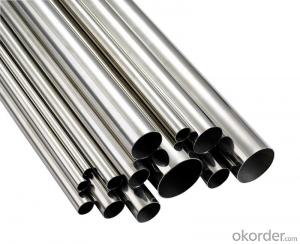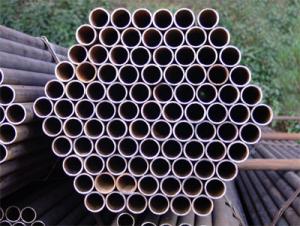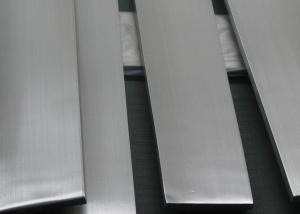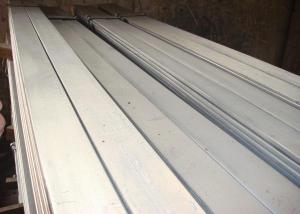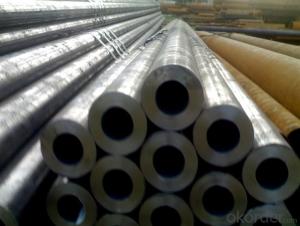316 Stainless Steel Pipe
- Loading Port:
- China main port
- Payment Terms:
- TT OR LC
- Min Order Qty:
- 5 m.t.
- Supply Capability:
- 100000 m.t./month
OKorder Service Pledge
OKorder Financial Service
You Might Also Like
Specification
SPECIFICATION
Stainless Steel Pipe:
1. 201, 202, 301, 304, 316L, 430, etc
2. OD: 6mm-159mm
3. Thickness: 0.25mm-3.5mm
4. Finish: Mirror, Satin, Hairline
316 STAINLESS STEEL PIPE:
Name | 316 Stainless steel pipe | |||||
Standard | ASTM A554,ASTM A312 | |||||
Material Grade | 201,202,304,316,316L,430 | |||||
Main Material
| a) 201 (Ni0.8%-1%) b) 202 (Ni: 3.0%-4.0%) d) 316 (Ni: 10% Cr: 18%) | |||||
Size Range | 139mm-1600mm ETC. | |||||
Thickness | 0.5-30mm | |||||
Length | 6m or as customers' request | |||||
Tolerance | a) Outer Diameter: +/- 0.2mm | |||||
b) Thickness: +/- 0.02mm | ||||||
c) Length: +/- 5mm | ||||||
Surface | 180G, 320G Satin/Hairline 400G, 600G Mirror finish | |||||
Application | handrail,railing, staircase, weldmesh screen,door,window, balcony,fence,bench,furniture,etc | |||||
Test | Squash test, extended test, water pressure test, crystal rot test, heat treatment, NDT | |||||
Chemical Composition of Material | 201 | 202 | 304 | 316L | 430 | |
C | ≤0.15 | ≤0.15 | ≤0.08 | ≤0.035 | ≤0.12 | |
Si | ≤1.00 | ≤1.00 | ≤1.00 | ≤1.00 | ≤1.00 | |
Mn | 5.5-7.5 | 7.5-10 | ≤2.00 | ≤2.00 | ≤1.00 | |
P | ≤0.06 | ≤0.06 | ≤0.045 | ≤0.045 | ≤0.040 | |
S | ≤0.03 | ≤0.03 | ≤0.030 | ≤0.030 | ≤0.030 | |
Cr | 13-15 | 14-17 | 18-20 | 16-18 | 16-18 | |
Ni | 0.7-1.1 | 3.5-4.5 | 8-10.5 | 10-14 | ||
Mo | 2.0-3.0 | |||||
Mechanical Property | Material Item | 201 | 202 | 304 | 316 | |
Tensile Strength | ≥535 | ≥520 | ≥520 | ≥520 | ||
Yield Strength | ≥245 | ≥205 | ≥205 | ≥205 | ||
Extension | ≥30% | ≥30% | ≥35% | ≥35% | ||
Hardness (HV) | <105< span=""> | <100< span=""> | <90< span=""> | <90 | ||
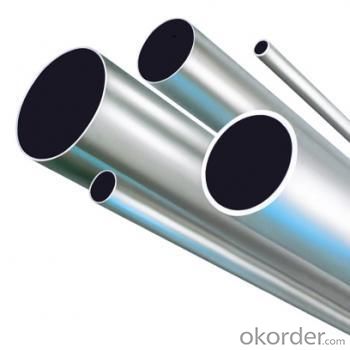
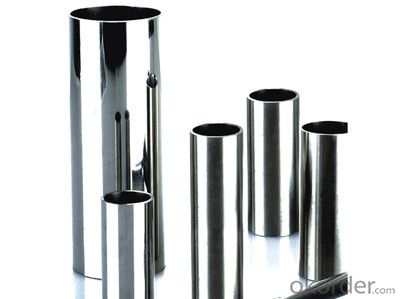
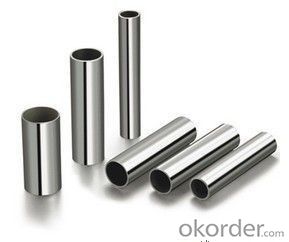
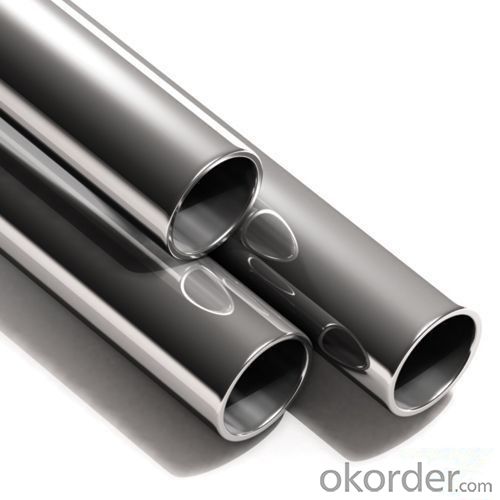
- Q: Can stainless steel pipes be buried in soil?
- Yes, stainless steel pipes can be buried in soil. Stainless steel is highly resistant to corrosion and can withstand the harsh conditions of being buried underground, making it a suitable choice for various underground applications such as drainage, sewage, and water supply systems.
- Q: How do you test the quality of stainless steel pipes?
- To test the quality of stainless steel pipes, several methods can be used. 1. Visual Inspection: The first step is to visually inspect the pipes for any visible defects such as cracks, dents, or surface irregularities. This can be done by simply observing the pipes closely and checking for any abnormalities. 2. Dimensional Inspection: The dimensions of the stainless steel pipes should meet the specified requirements. This involves measuring the outer diameter, inner diameter, wall thickness, and length of the pipes using calibrated measuring instruments such as calipers or micrometers. 3. Chemical Composition Analysis: Stainless steel pipes should have a specific chemical composition to ensure corrosion resistance and durability. This can be determined by conducting a chemical composition analysis, which involves using techniques like spectroscopy or wet chemical analysis to check the presence and percentage of different elements in the steel. 4. Mechanical Properties Testing: Mechanical properties such as tensile strength, yield strength, and elongation are crucial indicators of the quality of stainless steel pipes. These properties can be tested through various methods including tensile testing, hardness testing, impact testing, or bending testing. These tests are performed according to relevant industry standards to ensure the pipes meet the required mechanical specifications. 5. Non-destructive Testing: Non-destructive testing methods like ultrasonic testing, X-ray inspection, or electromagnetic testing can be employed to detect any hidden defects or inconsistencies within the stainless steel pipes without causing any damage. These tests are useful in identifying flaws such as cracks, voids, or inclusions that may compromise the quality and performance of the pipes. 6. Corrosion Resistance Testing: Stainless steel pipes are known for their excellent corrosion resistance. To verify their resistance to corrosion, various tests like salt spray testing or exposure to harsh environments can be conducted. These tests simulate real-life conditions to evaluate the pipes' ability to resist corrosion and ensure their long-term durability. It is important to note that the specific testing methods and standards may vary depending on the industry or application requirements. Therefore, it is essential to refer to relevant standards and specifications while conducting quality tests on stainless steel pipes.
- Q: Can stainless steel pipes be used for underground gas pipelines?
- Yes, stainless steel pipes can be used for underground gas pipelines. Stainless steel is highly resistant to corrosion and can withstand the harsh underground conditions, making it a suitable choice for gas pipelines.
- Q: Can stainless steel pipes be used for aerospace applications?
- Indeed, aerospace applications do employ stainless steel pipes. Renowned for its exceptional strength, endurance, and resistance to corrosion, stainless steel emerges as an optimal material for diverse aerospace components. To be specific, stainless steel pipes frequently find utility in aerospace for fuel and hydraulic systems, as well as for structural support and exhaust systems. The remarkable strength-to-weight ratio of stainless steel enables aircraft designs that are lighter and more fuel-efficient. Moreover, the ability of stainless steel to withstand high temperatures and extreme conditions renders it well-suited for aerospace applications where performance and reliability are paramount.
- Q: Can stainless steel pipes be used for hygienic applications?
- Yes, stainless steel pipes can be used for hygienic applications. Stainless steel is a highly durable and corrosion-resistant material that is commonly used in industries where hygiene is of utmost importance, such as food and beverage, pharmaceutical, and biotechnology sectors. Stainless steel pipes have a smooth surface that prevents the growth of bacteria and other microorganisms, making them suitable for applications where cleanliness is crucial. They are also easy to clean and maintain, as the smooth surface allows for efficient and thorough cleaning, reducing the risk of contamination. Moreover, stainless steel pipes are non-reactive and do not release any harmful substances into the products being transported. This makes them ideal for applications where sanitary conditions are essential, such as in the production and transportation of food, beverages, and pharmaceuticals. Additionally, stainless steel pipes have excellent resistance to high temperatures, chemicals, and corrosion, ensuring the integrity of the system and preventing any contamination or leaks. They are also highly durable and can withstand harsh operating conditions, making them a reliable choice for hygienic applications. In conclusion, stainless steel pipes are suitable for hygienic applications due to their durability, corrosion resistance, smooth surface, ease of cleaning, and non-reactivity. They provide a reliable and sanitary solution for industries where hygiene is a top priority.
- Q: What are the different types of stainless steel pipe supports?
- There are several types of stainless steel pipe supports, including pipe hangers, pipe clamps, pipe saddles, and pipe brackets. These supports are designed to securely hold and stabilize pipes in various applications and ensure proper alignment and distribution of weight. They come in different shapes, sizes, and configurations to accommodate different pipe diameters and mounting requirements.
- Q: Are stainless steel pipes resistant to chlorine corrosion?
- Stainless steel pipes have a general resistance against chlorine corrosion. The corrosion resistance of stainless steel is widely acknowledged, especially when it comes to chlorine and chlorinated water. This is because stainless steel contains high levels of chromium, which generates a protective oxide layer on the metal's surface. This layer acts as a barrier, shielding the stainless steel from the corrosive effects of chlorine. Nonetheless, it is crucial to consider that the degree of resistance to chlorine corrosion can vary based on the specific grade of stainless steel employed. Thus, it is vital to carefully choose the appropriate stainless steel grade that is specifically designed to withstand chlorine corrosion when utilizing stainless steel pipes in applications involving chlorinated water or chlorine-rich environments.
- Q: Are stainless steel pipes suitable for wastewater pumping stations?
- Yes, stainless steel pipes are suitable for wastewater pumping stations. Stainless steel is highly resistant to corrosion, making it an ideal choice for handling wastewater which can be corrosive in nature. Additionally, stainless steel pipes are strong, durable, and have a long lifespan, making them suitable for the demanding conditions of wastewater pumping stations.
- Q: Are stainless steel pipes suitable for underground water supply?
- Indeed, stainless steel pipes are a fitting choice for underground water supply. With its exceptional resistance to corrosion and rust, stainless steel proves to be an optimal material for underground usage, where pipes may confront moisture, soil, and other corrosive substances. Notably, stainless steel pipes exhibit durability, longevity, and possess a remarkable tensile strength, enabling them to endure the pressure and strain of underground installations. Furthermore, stainless steel pipes maintain hygiene and do not release detrimental chemicals or pollutants into the water supply. All in all, stainless steel pipes present a dependable and secure alternative for underground water supply systems.
- Q: What is the lifespan of stainless steel pipes?
- The lifespan of stainless steel pipes can vary depending on various factors such as the grade of stainless steel used, the environment in which they are installed, and the maintenance and care they receive. However, in general, stainless steel pipes have a long lifespan compared to other materials commonly used for piping systems. Stainless steel pipes are known for their durability and corrosion-resistant properties. They are designed to withstand harsh conditions, high temperatures, and various corrosive substances, making them suitable for a wide range of applications. This inherent resistance to corrosion allows stainless steel pipes to have a longer lifespan than pipes made from materials like carbon steel or plastic. In ideal conditions and proper maintenance, stainless steel pipes can last for several decades or even longer. In some cases, stainless steel pipes have been known to last for over 100 years. However, it is important to note that the actual lifespan can vary depending on the specific application and the level of care provided. Regular inspection, maintenance, and cleaning can help extend the lifespan of stainless steel pipes. This includes removing any deposits or buildup that may occur over time, as well as addressing any signs of corrosion or damage promptly. Additionally, choosing the appropriate grade of stainless steel for the intended application can also contribute to a longer lifespan. Overall, stainless steel pipes are known for their durability and longevity. With proper care and maintenance, they can provide reliable and efficient performance for many years, making them a popular choice in various industries and applications.
Send your message to us
316 Stainless Steel Pipe
- Loading Port:
- China main port
- Payment Terms:
- TT OR LC
- Min Order Qty:
- 5 m.t.
- Supply Capability:
- 100000 m.t./month
OKorder Service Pledge
OKorder Financial Service
Similar products
Hot products
Hot Searches
Related keywords
